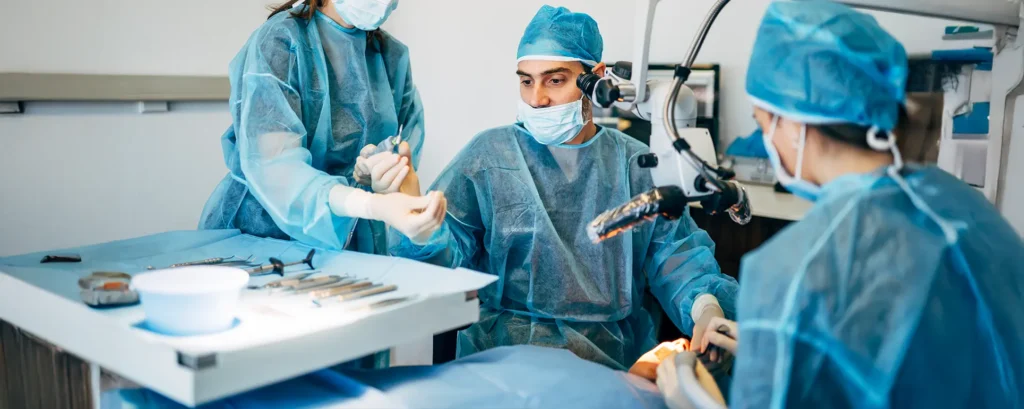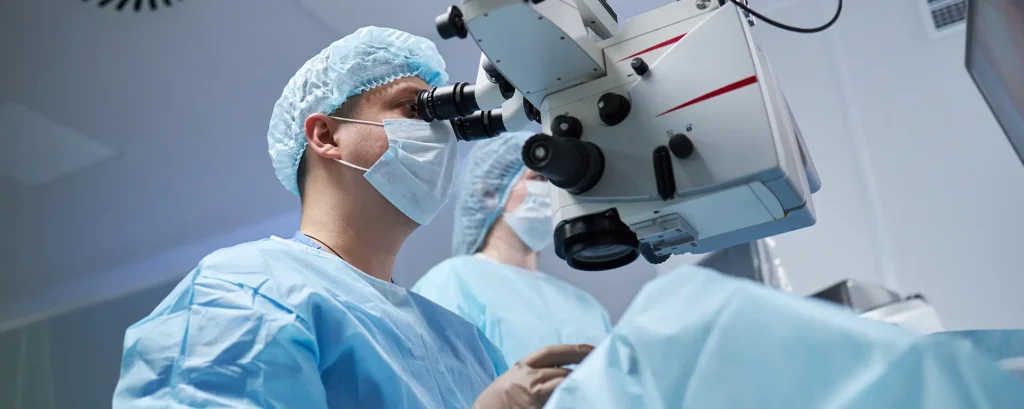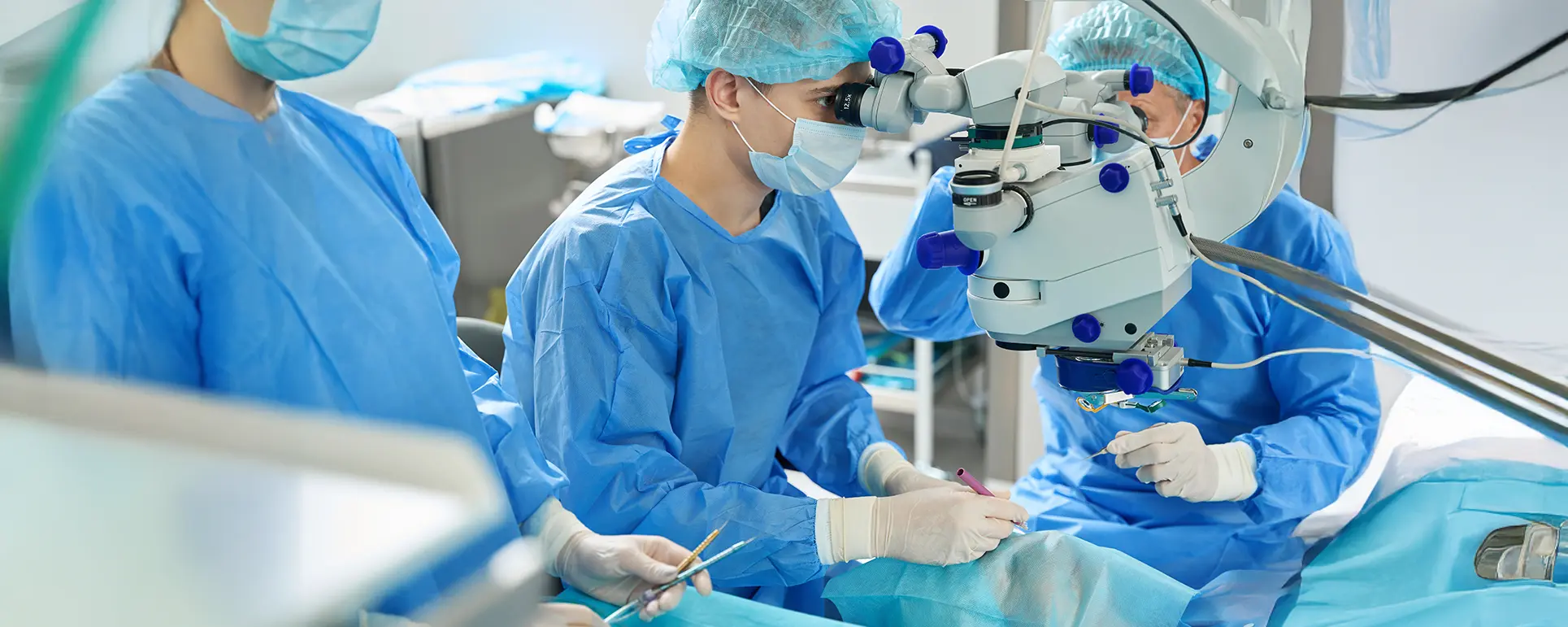Cataract surgery is one of the most common and successful procedures carried out in the UK today. If you’ve been told you need surgery, it’s natural to wonder how long the whole process will take. Many people think only about the time spent in the operating theatre, but the truth is that cataract surgery is a journey made up of different steps — from your admission to the clinic, through preparation, anaesthesia, the operation itself, and then recovery before you head home.
In this guide, I’ll walk you through every stage of the cataract surgery timeline. By the end, you’ll have a clear picture of what to expect on the day, how long each step usually lasts, and why the entire hospital visit is often longer than the operation itself.
Understanding the Big Picture

When we talk about how long cataract surgery takes, we need to split things into two categories. First, there’s the actual time spent operating on your eye — which is surprisingly short, usually under 30 minutes. Then, there’s the total time spent at the hospital or clinic. This second figure is always longer, because it includes admission checks, waiting for your slot in theatre, preparation for surgery, the procedure itself, recovery time, and discharge.
For most patients, the full hospital visit lasts anywhere from two to four hours, though this can vary depending on the clinic, how busy the theatre schedule is, and your individual health.
Step 1: Admission and Pre-Surgery Checks
The day begins when you arrive at the hospital or eye clinic. You’ll usually be asked to come in at a specific time, which is often well before your actual operation. This is to allow the staff to carry out all the necessary checks without any rush.
When you arrive, you’ll be booked in by the reception team. A nurse will then take you through a few routine checks. These might include measuring your blood pressure, heart rate, and oxygen levels. If you’re on any medication, you’ll be asked to confirm what you’ve taken that day. If you have diabetes, for example, the nurse might check your blood sugar levels as well.
This stage is also when you’ll be asked to sign consent forms if you haven’t already done so. The surgeon or another member of the clinical team will come to speak with you to make sure you fully understand what will happen. They may mark the eye that’s being treated, just to avoid any confusion. Altogether, admission and checks usually take 30 to 60 minutes.
Step 2: Anaesthetic and Pupil Dilation
Once the initial checks are done, you’ll move on to the preparation for surgery. Cataract surgery is most often performed using local anaesthetic. This means your eye will be numbed, but you’ll remain awake throughout the procedure. Don’t worry — you won’t feel pain during the operation.
The anaesthetic is usually given in the form of eye drops, although in some cases a small injection around the eye may be used. In addition, dilating drops will be placed into your eye to widen your pupil. This allows the surgeon to get a clear view of your lens and operate with precision.
These drops take time to work. You might find your vision goes blurry, and you may notice sensitivity to light as your pupil enlarges. Most people find this part of the process painless, though the drops may sting for a few seconds. The whole preparation stage generally takes 20 to 40 minutes.
Step 3: Waiting for Theatre
Once your eye has been prepared, you’ll often be asked to wait until the surgical theatre is ready for you. Depending on how many patients are scheduled that day, this wait can be very short or up to an hour or more. Some clinics will give you a comfortable chair or bed to rest on while you wait.
It can feel a little nerve-wracking at this stage, but remember — the waiting is often the longest part of the entire process. The surgery itself will fly by in comparison. If you’re feeling anxious, let the nursing team know. They are used to reassuring patients and can help you feel more comfortable.
Step 4: Entering Theatre and Setting Up

When it’s your turn, you’ll be taken into the theatre. You’ll lie down on a reclining chair or surgical bed. The team will clean around your eye with a special antiseptic solution and cover the area with a sterile drape, leaving just your eye exposed. This keeps everything clean and reduces the risk of infection.
A bright light will be positioned above you. This is the microscope the surgeon uses to see the structures inside your eye in great detail. You may also hear the sound of equipment being prepared. Don’t worry — the team will talk you through what’s happening so you know what to expect.
This setting-up stage usually lasts about 5 to 10 minutes.
Step 5: The Cataract Surgery Procedure
Now comes the part most people focus on: the actual cataract operation. Despite being delicate eye surgery, it’s usually very quick. Most cataract surgeries take between 10 and 20 minutes from start to finish.
The surgeon will begin by making a tiny incision at the edge of your cornea. Using ultrasound energy in a technique called phacoemulsification, the cloudy lens is broken up into small fragments. These fragments are then gently suctioned out. Once the lens material is removed, an artificial intraocular lens (IOL) is inserted into the same capsule that held your natural lens. This IOL remains in place permanently, giving you clear vision.
Throughout the procedure, you might see bright lights and colours, but you shouldn’t feel pain. Some patients describe a sense of pressure or movement in the eye, but nothing more.
Step 6: Closing and Finishing Up
After the new lens is securely in place, the surgeon checks everything carefully. In most modern cataract operations, the incision is so small that it seals naturally without the need for stitches. The eye is left watertight, and the team applies antibiotic drops to reduce the risk of infection.
The sterile drape is removed, and you may be given a protective eye shield or patch. This is to protect your eye from accidental rubbing or knocks as the anaesthetic wears off. This finishing stage takes about 5 minutes.
Step 7: Recovery Room
You’ll then be moved into a recovery area. Here, nurses will monitor you for a short period to make sure you’re comfortable and that there are no immediate issues. You may be offered a drink and a light snack.
Your vision will still be blurry at this point, and the eye may feel a little gritty or watery. This is completely normal. You’ll usually stay in the recovery area for 20 to 40 minutes, depending on how you feel.
Step 8: Discharge and Going Home
Before you leave, you’ll be given clear instructions on how to look after your eye. This will include how to use the prescribed eye drops, which usually need to be applied several times a day for the first few weeks. You’ll also be told what to avoid in the early days — such as rubbing your eye, swimming, or heavy lifting.
Most people are discharged the same day, usually within 2 to 4 hours of arriving at the clinic. You won’t be able to drive yourself home, so you’ll need to arrange for someone to pick you up.
Typical Timeline in Numbers
- Admission and checks: 30–60 minutes
- Anaesthetic and dilation: 20–40 minutes
- Waiting for theatre: 15–60 minutes
- Setting up in theatre: 5–10 minutes
- Operation itself: 10–20 minutes
- Finishing up: 5 minutes
- Recovery: 20–40 minutes
- Discharge: 10–20 minutes
Total time in hospital/clinic: 2 to 4 hours on average.
Why Timing Can Vary
It’s important to remember that not every patient’s journey is identical. The timeline can vary for several reasons:
- Clinic scheduling: If the list of patients is long, waiting times may increase.
- Anaesthetic choice: Some people may need a different form of anaesthetic, which takes longer to administer.
- Medical conditions: If you have other health issues, such as high blood pressure or heart problems, the team may need extra time to monitor you.
- Complexity of cataract: While most surgeries are straightforward, some cataracts are more advanced or complicated, which can extend the time in theatre.
What Happens Afterwards
Your eye will take a few weeks to fully heal, but you should notice clearer vision quite quickly — often within a day or two. Follow-up appointments are usually arranged within the first couple of weeks to check your progress.
Even though the operation itself is short, it’s worth remembering that recovery is a process. Being patient and following your surgeon’s advice will help you get the best possible outcome.
FAQ Section
1. How long does the cataract operation itself take?
The actual procedure is surprisingly short. Most cataract surgeries take between 10 and 20 minutes from the first incision to the placement of the new lens. Although this can feel quick, the efficiency comes from well-practised techniques and highly specialised equipment. Even if your case is a little more complex, it’s rare for the surgeon to need more than 30 minutes in theatre.
2. How long will I be in the hospital or clinic on the day?
While the surgery itself is brief, the overall hospital visit is longer. Most patients spend between two and four hours at the clinic because of admission, preparation, anaesthetic, waiting for theatre, recovery, and discharge. This extra time is important, as each stage ensures your safety and comfort before, during, and after the procedure.
3. Why do I have to wait before my surgery starts?
Waiting is part of almost every cataract surgery day. Your pupil needs time to dilate fully after the drops are given, and the theatre team need to prepare the room carefully between patients. In addition, surgical lists often include several people, so you may have to wait until your turn comes. This doesn’t mean there’s a problem — it simply reflects the careful organisation behind the scenes.
4. Will I be awake during cataract surgery?
Yes, nearly all cataract operations in the UK are performed with local anaesthetic, which means you’ll be awake but your eye will be completely numb. You won’t feel pain, though you may notice lights, colours, or gentle movement as the surgeon works. Many patients are surprised at how quick and painless the experience is once they are in theatre.
5. Can the surgery take longer if there are complications?
It can, though this isn’t common. If your cataract is especially dense, or if you have another eye condition, the surgeon may need to take more time to work carefully. A routine case is usually finished in 20 minutes, but a complex one might take up to 40 minutes. The important thing to remember is that your surgeon will always go at the safest pace for your eye.
6. How soon after the operation can I go home?
Most patients are ready to leave within an hour or two after their surgery. You’ll spend a short time in the recovery area while the team make sure you feel comfortable and give you your post-operative instructions. Because your vision may still be blurry, you’ll need someone to accompany you home. Clinics don’t let patients drive themselves on the day of surgery.
7. Do both eyes get operated on at the same time?
In the UK, cataract surgery is usually done one eye at a time, with a gap of a few weeks between them. This approach ensures the first eye has healed well before moving to the second. In some situations, both eyes can be treated on the same day, but this is less common and depends on your surgeon’s recommendation and your individual case.
8. Will I be able to see straight after surgery?
Straight after surgery your vision will be blurry, mainly because of the dilating drops and the bright light used during the operation. However, many people start noticing clearer vision within 24 to 48 hours. Your brain also needs time to adapt to the new lens. It may take a few weeks before your vision feels fully settled and stable.
9. Does cataract surgery hurt once the anaesthetic wears off?
Most people describe only mild discomfort after the operation. Your eye may feel slightly gritty, watery, or itchy for a few days, but this usually improves quickly. You’ll be given eye drops that reduce inflammation and prevent infection, which also help with comfort. Severe or ongoing pain is very unusual and should always be reported to your surgeon straight away.
10. How long does it take to recover fully after cataract surgery?
Initial recovery is fast — most patients feel comfortable and notice better vision within a few days. However, it takes around four to six weeks for the eye to heal completely. During this time, you’ll be asked to avoid strenuous activities such as swimming or heavy lifting. Your follow-up appointments allow the surgeon to check that your eye is healing as expected.
Final Thoughts
So, how long does cataract surgery take? The truth is that the actual operation is usually completed in less than 30 minutes, but the entire journey on the day — including admission, preparation, anaesthesia, waiting for theatre, recovery, and discharge — means you should plan to be at the clinic for two to four hours in total. Knowing this timeline can help ease anxiety and makes the whole process feel more predictable.
If you’re thinking about having cataract surgery, the key is not just timing but also choosing a clinic you can trust. At the London Cataract Centre, our experienced team carry out procedures with precision, care, and patient comfort at the forefront. Whether you’re still weighing up your options or you’re ready to go ahead, find out whether private cataract surgery is the right choice for you today.
References
- England. NHS. (2022) Making a decision about cataracts. [PDF]. Available at: https://www.england.nhs.uk/wp-content/uploads/2022/07/Making-a-decision-about-cataracts.pdf (Accessed: 23 September 2025). (NHS England)
- Syed, ZA., Brian, G., Malik, AS., Fraser, DG., et al. (2015) ‘Cataract surgery outcomes at a UK independent sector’, Journal of Cataract & Refractive Surgery, 41(5), pp. 1062-1071.
- Naderi, K., et al. (2023) ‘Immediate Sequential Bilateral Cataract Surgery versus two unilateral surgeries: comparative time outcomes’, PMC, 2023. Available at: https://pmc.ncbi.nlm.nih.gov/articles/PMC10239710/ (Accessed: 23 September 2025).
- Kirkwood, G., Cairns, J., and Bremner, K. (2023) ‘Waiting Times for Cataract Surgery in Scotland since 2002’, Journal of Ophthalmic Health, 15(2), pp. 87-97.

